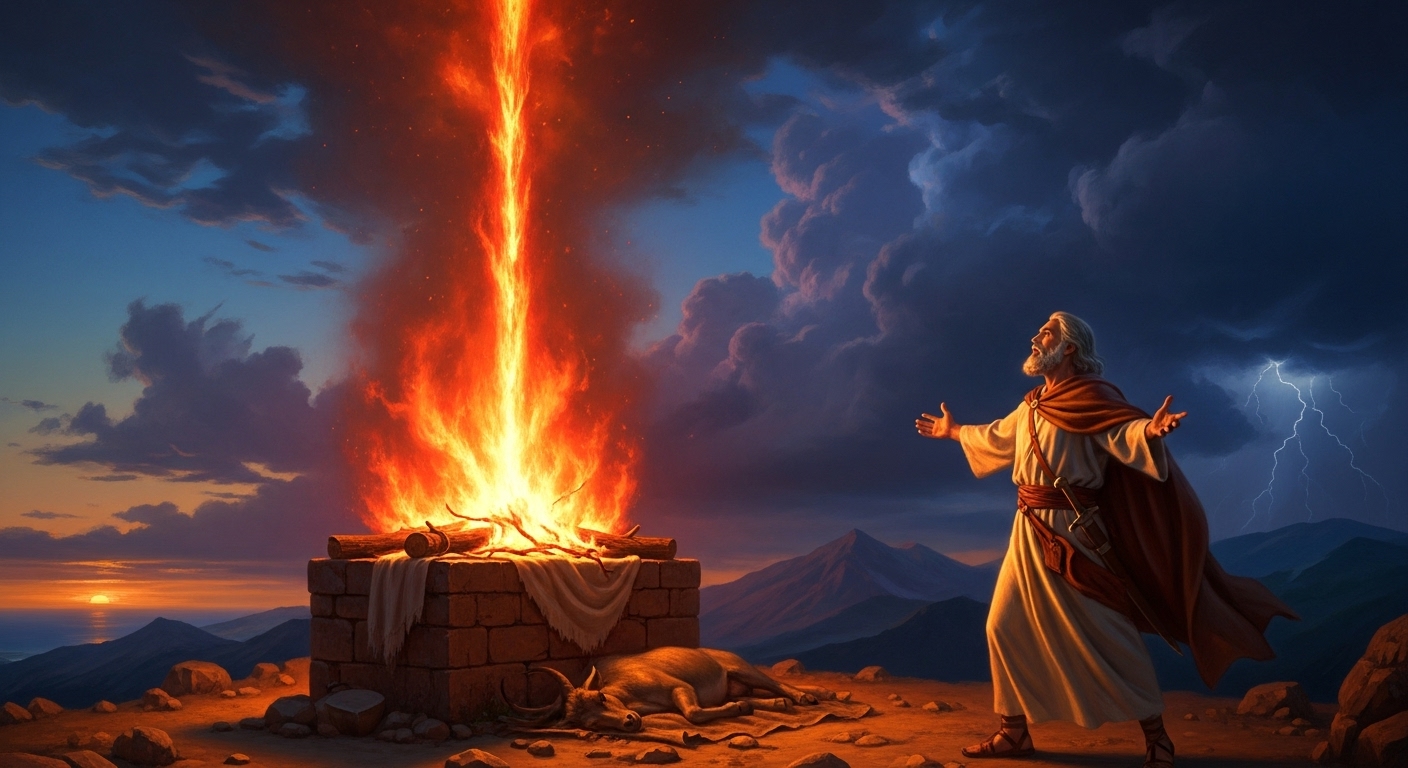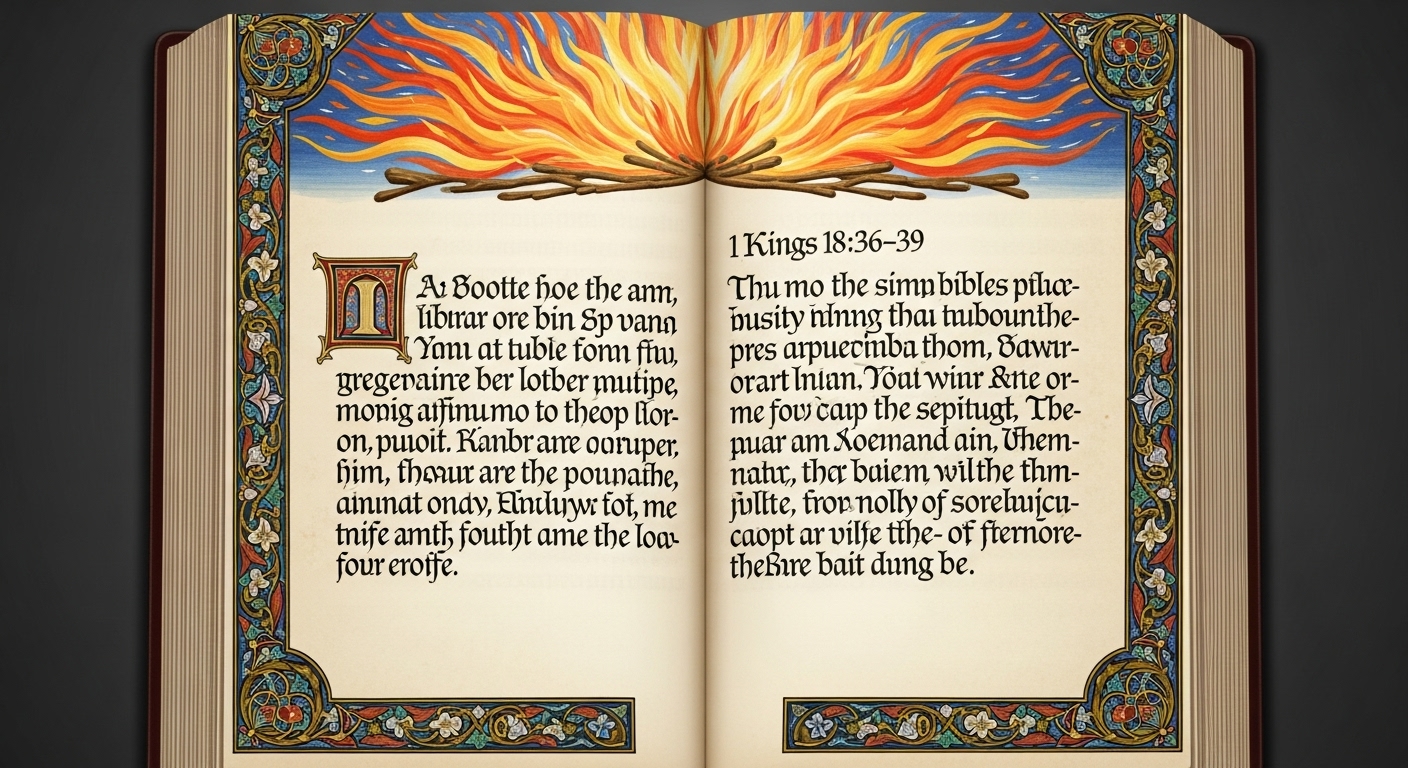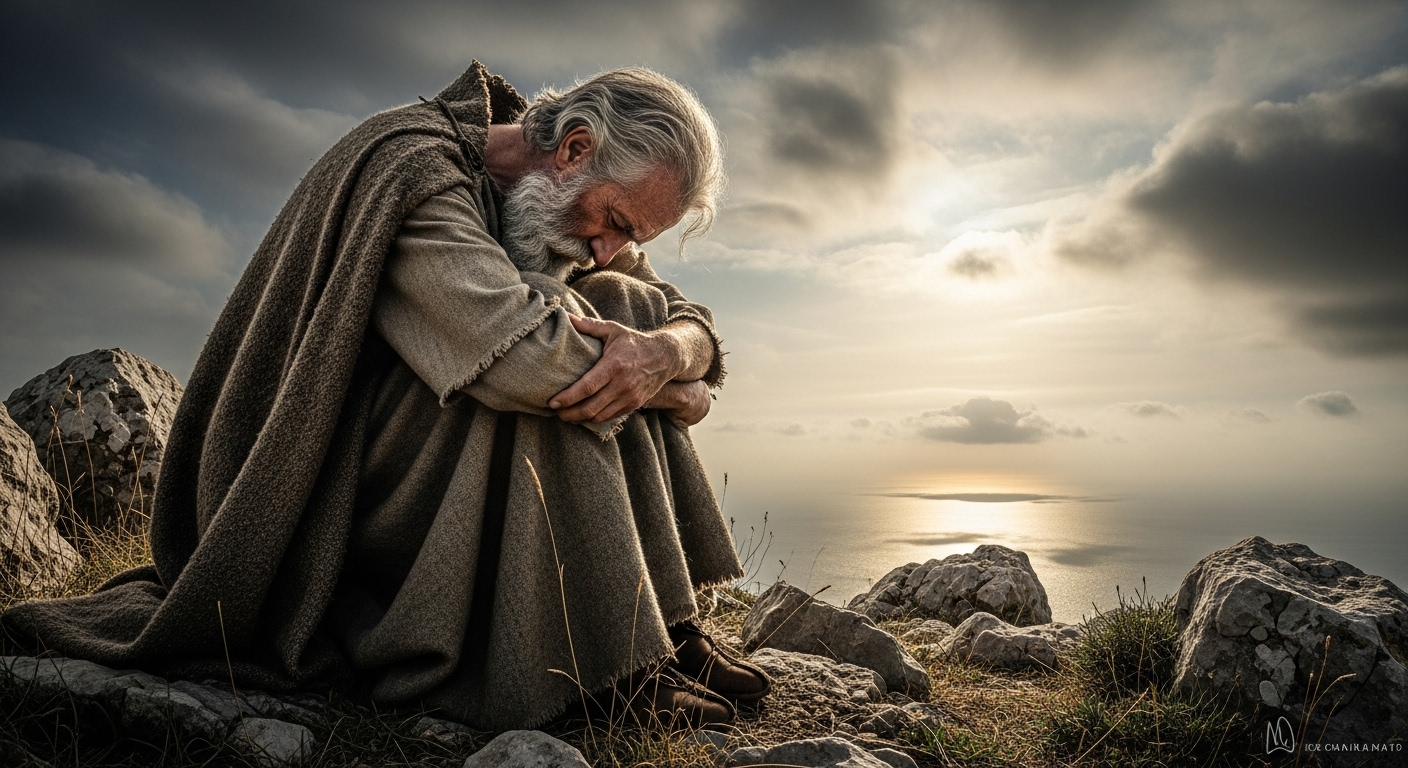Elijah’s Faith – Praying For Fire And Rain

Introduction
Have you ever stood at the edge of a cliff in your own life and felt like you needed God to move in a dramatic way? Maybe you’re asking for breakthrough, for conviction in a loved one’s heart, or for a season of restoration after drought. Elijah’s story gives you an honest, emotional mirror: he prayed for fire to fall and later asked God to send rain. Those are extreme requests, but they grew out of a deep relationship with God and a trust that God could change the weather of a nation — and the weather of a heart.
You’ll find in this story not just spectacle, but practical lessons on how to pray boldly, wait patiently, and listen humbly. In the next sections you’ll walk through the Scripture, uncover the core truth behind Elijah’s actions, and find real steps you can use when you’re praying for “fire and rain” in your own life.
The Bible Foundation
Key Passages
Read the moment of fire here: 1 Kings 18:36–39 (NIV)

1 Kings 18:36–39 (NIV) 36 At the time of sacrifice, the prophet Elijah stepped forward and prayed: “LORD, the God of Abraham, Isaac and Israel, let it be known today that you are God in Israel and that I am your servant and have done all these things at your command.
37 Answer me, LORD, answer me, so these people will know that you, LORD, are God, and that you are turning their hearts back again.”
38 Then the fire of the LORD fell and burned up the sacrifice, the wood, the stones, and the soil, and also licked up the water in the trench.
39 When all the people saw this, they fell prostrate and cried, “The LORD—he is God! The LORD—he is God!”
Read the moment of rain here: 1 Kings 18:41–46 (NIV)
1 Kings 18:41–46 (NIV) 41 And Elijah said to Ahab, “Go, eat and drink, for there is the sound of heavy rain.”
42 So Ahab went off to eat and drink, but Elijah climbed to the top of Carmel, bent down to the ground, and put his face between his knees.
43 “Go and look toward the sea,” he told his servant. And he went up and looked. “There is nothing there,” he said. Seven times Elijah said, “Go back.”
44 The seventh time the servant reported, “A cloud as small as a man’s hand is rising from the sea.” So Elijah said, “Go and tell Ahab, ‘Hitch up your chariot and go down before the rain stops you.'”
45 Meanwhile, the sky grew black with clouds, the wind rose, a heavy rain came on, and Ahab rode off to Jezreel.
46 The hand of the LORD was on Elijah; he tucked his cloak into his belt and ran ahead of Ahab to the entrance of Jezreel.
These passages—one showing God’s dramatic affirmation through fire and the other showing God’s reversal of drought through rain—frame the heartbeat of Elijah’s ministry: he prayed boldly, acted faithfully, and waited expectantly.
Understanding the Core Truth
At the simplest level, the core truth is this: God honors faith-filled, obedient prayer that seeks His glory and aligns with His heart. Elijah wasn’t praying to prove his own power. He prayed to reveal God to a stubborn, idol-worshiping nation and to bring the people back to the LORD. The request for fire and the request for rain are two sides of the same coin: both ask God to intervene visibly and transform reality.
When you’re Praying for Fire and Rain, you’re learning to ask God for both purification (fire) and provision or blessing (rain). Elijah’s confidence came from knowing God’s character: He is the sovereign God who answers when His name and mission are at stake. You can translate this into your life: bold prayer is not arrogance—it’s a dependence that seeks God’s glory, His justice, and His mercy.
Going Deeper — The Hidden Meaning

Beneath the spectacle of fire and the drama of rain is a quieter, deeper teaching: prayer is relational and patient. After the showdown on Mount Carmel, Elijah’s life didn’t become easier. He ran in fear and hid in a cave (1 Kings 19). God’s response to Elijah was not more fireworks but a gentle stillness—the “still small voice”—that reminded Elijah of God’s continued presence and purpose.
Also notice Elijah’s persistent posture in prayer: he sent the servant to look for clouds seven times. That repetition isn’t ritual for its own sake; it’s an example of patient watching and incremental faith. The cloud begins as “as small as a man’s hand” and grows. The miracle often starts imperceptibly, and your prayer may be answered in stages. You’re invited into both the dramatic and the patient rhythms of God.
When you’re Praying for Fire and Rain, don’t skip the cave or the quiet. The deep work is often in listening, repenting, and staying steady while God prepares the change.
Modern Connection — Relevance Today
How does Elijah’s 9th-century BC drama translate to your 21st-century life? In at least three ways:
- Boldness to speak truth in a culture that’s comfortable with compromise. If your workplace, family, or friend group needs course correction, you can pray and act with courage, not a spirit of condemnation.
- Asking God for visible intervention. Maybe you need a breakthrough in addiction, a breakthrough in a relationship, or a financial turnaround. Prayers that ask God to move publicly and clearly are not foreign to Scripture.
- Patience and step-by-step expectation. Like the seven look toward the sea, your answers might come slowly—but they are not absent. Keep watching, and notice the small cloud as it forms.
You don’t need to petition God for spectacle to have faith; you do need to pray with clarity about what you’re asking and humility about how God will answer.
Practical Application — Living the Message

You can put Elijah’s example into practice today with simple, doable steps:
- Be specific. When Elijah prayed, he asked for God’s reputation to be known. Name what you want God to do and why it honors Him.
- Pray with a posture of humility. Elijah asked not for personal glory but for God’s glory and for the nation’s return. Let your prayer reflect God’s priorities.
- Watch and persist. Send the servant out—metaphorically—by checking the situation, staying alert, and praying again. Persistence isn’t nagging; it’s faithful expectancy.
- Pair prayer with obedience. Elijah confronted Ahab and the people. When you pray for a breakthrough, be ready to act where God calls you.
- Gather support. You don’t have to pray alone. Invite others to pray with you; community amplifies faith.
Try a short prayer template you can use: “Lord, I ask You to [specific request], not for my pride but that Your name would be honored and Your purposes advanced. Give me eyes to see how You work, patience to wait, and courage to step when You call. Amen.”
These steps help you practice Praying for Fire and Rain in daily life—big asks grounded in God’s glory and your obedience.
🌿 Faith Reflection Box
Take a moment. Where in your life do you need a visible word from God—fire for conviction or rain for restoration? What small step of obedience could you take this week while you wait?
Key Takeaways:
- Pray boldly with God’s glory in view.
- Persist patiently and watch for small signs of change.
- Pair prayer with humility and obedience.
- Invite the community to stand with you in prayer.
Q&A
Q1: Did Elijah manipulate God by praying for fire? Answer: No, Elijah did not manipulate God. He prayed to make God known and to turn hearts back to the LORD, which aligns with God’s own desire for His name to be honored. Elijah’s prayer demonstrates faith and dependence, not coercion. Scripture recognizes this power of prayer: “Elijah was human, even as we are,” and his prayer moved God (James 5:17). See James 5:17 (NIV). See this related post: Noah’s Righteousness – Standing Out In A Wicked World
Q2: How do I pray for “fire” and “rain” in a way that’s biblical for today? Answer: Think of “fire” as refining, convicting, or awakening—asking God to burn away what hinders His work. Think of “rain” as restoration, provision, and blessing. Pray specifically for hearts to turn, for sins to be exposed, and for needs to be met, always seeking God’s glory. Ask with humility and be ready to respond to God’s correction. See Elijah’s approach in 1 Kings 18:36–39 (NIV). See this related post: https://biblestorieshub.com/elijahs-bold-faith-at-mount-carmel-gods-power-on-display/
Q3: What if I pray boldly and nothing seems to happen? Answer: Waiting doesn’t mean failure. God often answers in stages or in ways you don’t expect. Elijah’s rain started as a tiny cloud; sometimes answers begin small. Use waiting as an opportunity to grow in faith and obedience—look for the “small cloud” signs and keep your heart soft. Remember Romans 8:28 about God working for good (see Romans 8:28 (NIV)). Keep praying, keep watching, and stay aligned with God’s character.
Q4: Is it wrong to ask God for dramatic signs? Answer: It’s not inherently wrong to ask for signs, but Jesus warned against demanding signs as the only measure of faith (Matthew 12:38-39). The healthiest posture is asking with humility and readiness to follow God, whether He provides signs or not. Ask for clarity and confirmation when needed, but let your faith be rooted in God’s revealed character, not only in miraculous verification. See Matthew 12:38-39 (NIV).
Conclusion & Reflection
Elijah’s story invites you to a faith that is bold enough to ask for the extraordinary and humble enough to wait in the quiet. Praying for fire and rain isn’t about summoning spectacle for your own sake; it’s about seeking God’s glory, turning hearts to Him, and trusting in His timing. You can learn from Elijah’s courage, his persistence, and his vulnerability after victory. When you pray, stand firmly on God’s character, watch for the small cloud, and be ready to act when He moves.
A short prayer you can carry with you: Lord, give me the faith to ask boldly, the humility to wait patiently, and the obedience to follow you wherever you see Your hand at work. Make Your name known in my life and in the places I care for. Amen.

Explore More
For further reading and encouragement, check out these posts:
👉 7 Bible Verses About Faith in Hard Times
👉 Job’s Faith: What We Can Learn From His Trials
👉 How To Trust God When Everything Falls Apart
👉 Why God Allows Suffering – A Biblical Perspective
👉 Faith Over Fear: How To Stand Strong In Uncertain Seasons
👉 How To Encourage Someone Struggling With Their Faith
👉 5 Prayers for Strength When You’re Feeling Weak

📘 Jesus and the Woman Caught in Adultery – Grace and Mercy Over Judgement
A powerful retelling of John 8:1-11. This book brings to life the depth of forgiveness, mercy, and God’s unwavering love.
👉 Check it now on Amazon 🛒💥
🔥 “Every great message deserves a home online.” 🌍💬🏡
Don’t let your calling stay hidden. Start a Christian blog or website using Hostinger — with 99.9% uptime, a free domain, and SSL, your voice can shine for God’s glory anytime, anywhere.
💥 Begin today. 🛒 Try it RISK-FREE! ✅
✝️ “Your body is God’s temple — care for it with purpose.” 💪💖🏛️
Renew your energy and restore balance naturally. Mitolyn helps support a healthy metabolism, giving you the vitality to live out God’s calling with strength and confidence.
🔥 Unlock Your Metabolic Power! ⚡Burn More Calories & Feel Great With Mitolyn. 💪
👉 Start Today. 🚀 Check Price Now. 🛒💰
💰 As a ClickBank & Amazon Affiliate, I earn from qualifying purchases.
📖 Acknowledgment: All Bible verses referenced in this article were accessed via Bible Gateway (or Bible Hub).
🚀 Want to explore more? 👉 Dive into our new post on Why Jesus? and experience the 🔥 life-changing truth of the Gospel!








